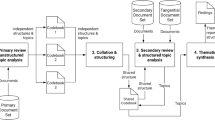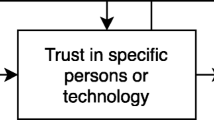Abstract
The phenomenon of distributed knowledge is well-known in epistemic logic. In this paper, a similar phenomenon in ethics, somewhat neglected so far, is investigated, namely distributed morality. The article explains the nature of distributed morality, as a feature of moral agency, and explores the implications of its occurrence in advanced information societies. In the course of the analysis, the concept of infraethics is introduced, in order to refer to the ensemble of moral enablers, which, although morally neutral per se, can significantly facilitate or hinder both positive and negative moral behaviours.




Similar content being viewed by others
Notes
For the logically-minded reader, these are not formulae but mere abbreviations. They could be transformed into formulae by adopting a quantification ranging over the domain of all actions occurring in the system under observation, but this would be cumbersome and provide no further insights. The same holds true for an analysis in terms of deontic logic.
Universalization is an obvious factor that can help in such a strategy. By universalization I refer here to the normative coordination of the possibly good, distributed actions of a multiagent system: agents constituting a MAS ought to implement, optimise and coordinate their actions in such a way as to make them converge on the achievement of a morally good output. There are of course several other ways of understanding ethical universalization, see my reply to Stahl in Floridi (2008a).
I am grateful to Massimo Durante for having called my attention to this important point.
Source: CharityFacts, http://www.charityfacts.org/charity_facts/charity_costs/index.html.
Source: Eurostat—Community survey on ICT usage in Households and by Individuals, http://scoreboard.lod2.eu/index.php?scenario=2&indicators%5B%5D=i_iuport+IND_TOTAL+%25_ind&countries%5B%5D=EU27#chart.
See for example LCD'07—Workshop on Logics and Collective Decision Making, Erasmus International Institute MSH Nord-Pas-de-Calais, March 13–14, 2007, Lille, France.
For the non-philosopher, metaethics is the branch of philosophy that studies the nature of ethical theories, properties, statements, attitudes, and evaluations.
References
Adam, A. (2005). Delegating and distributing morality: Can we inscribe privacy protection in a machine? Ethics and Information Technology, 7(4), 233–242.
Allgrove, B. (2004). Legal personality for artificial intellects: Pragmatic solution or science fiction? SSRN eLibrary.
Andrade, F., et al. (2004). Software agents as legal persons. In L. M. Camarinha-Matos (Ed.), Virtual enterprises and collaborative networks. Dordrecht: Kluwer Academic Publishers.
Andrade, F., et al. (2007). Contracting agents: Legal personality and representation. Artificial Intelligence and Law, 15(4), 357–373.
Barfield, W. (2005). Issues of law for software agents within virtual environments. Presence: Teleoperators and Virtual Environments, 14(6), 741–748.
Cavoukian, A. (2009). Privacy by design. Ottawa: IPC Publications.
Chopra, S., & Dexter, S. (2008). Decoding liberation: The promise of free and open source software. New York: Routledge Studies in New Media and Cyberculture, Routledge.
Daniels, N. (1996). Justice and justification: Reflective equilibrium in theory and practice. Cambridge: Cambridge Studies in Philosophy and Public Policy, Cambridge University Press.
Donaldson, T. (1982). Corporations and morality. Englewood Cliffs, NJ: Prentice-Hall.
Ewin, R. E. (1991). The moral status of the corporation. Journal of Business Ethics, 10(10), 749–756.
Fagin, R., et al. (1995). Reasoning about knowledge. Cambridge, MA, London: MIT Press.
Floridi, L. (1999). Information ethics: On the philosophical foundations of computer ethics. Ethics and Information Technology, 1(1), 37–56.
Floridi, L. (2003). On the intrinsic value of information objects and the infosphere. Ethics and Information Technology, 4(4), 287–304.
Floridi, L. (2005). The ontological interpretation of informational privacy. Ethics and Information Technology, 7(4), 185–200.
Floridi, L. (2006). Four challenges for a theory of informational privacy. Ethics and Information Technology, 8(3), 109–119.
Floridi, L. (2008a). Information ethics: A reappraisal. Ethics and Information Technology, 10(2–3), 189–204.
Floridi, L. (2008b). The method of levels of abstraction. Minds and Machines, 18(3), 303–329.
Floridi, L. (2010a). Network ethics: Information and business ethics in a networked society. Journal of Business Ethics, 90(4), 649–659.
Floridi, L. (Ed.). (2010b). The cambridge handbook of information and computer ethics. Cambridge: Cambridge University Press.
Floridi, L. (2011). The philosophy of information. Oxford: Oxford University Press.
Floridi, L. (forthcoming), Information Ethics. Oxford: Oxford University Press.
Floridi, L., & Sanders, J. W. (2001). Artificial evil and the foundation of computer ethics. Ethics and Information Technology, 3(1), 55–66.
Floridi, L., & Sanders, J. W. (2004). On the morality of artificial agents. Minds and Machines, 14(3), 349–379.
Gips, J. (1995). Towards the ethical robot. In K. Ford, C. Glymour & P. Hayes (Eds.), Android epistemology (pp. 243–252). Cambridge, MA: MIT Press.
Greco, G. M., & Floridi, L. (2004). The tragedy of the digital commons. Ethics and Information Technology, 6(2), 73–82.
Halpern, J. Y., & Moses, Y. (1990). Knowledge and common knowledge in a distributed environment. Journal of the Association for Computing Machinery, 37(3), 549–587.
Hardin, G. (1968). The tragedy of the commons. Science, 162(3859), 1243–1248.
Hardin, G. (1998). Extensions of the tragedy of the commons. Science, 280(5364), 682–683.
Hildebrandt, M. (2008). Ambient intelligence, criminal liability and democracy. Criminal Law and Philosophy, 2(2), 163–180.
Hildebrandt, M. (2011). Criminal liability in a smart environment. In R. A. Duff & S. P. Green (Eds.), Philosophical foundations of criminal law (pp. 507–532). Oxford University Press.
Jonsen, A. R., & Butler, L. H. (1975). Public ethics and policy making. Hastings Center Report, 5(4), 19–31.
Koops, B. J., Hildebrandt, M., & Jaquet-Chiffelle, D. O. (2010). Bridging the accountability gap: Rights for new entities in the information society? Minnesota Journal of Law, Science & Technology, 11(2), 497–561.
Kroes, P. & Verbeek, P. -P. (forthcoming). Moral agency and technical artefacts. Springer.
May, L. (1983). Vicarious agency and corporate responsibility. Philosophical Studies, 43(1), 69–82.
Narveson, J. (2002). Collective responsibility. The Journal of Ethics, 6(2), 179–198.
Pagallo, U. (2012). On the principle of privacy by design and its limits: Technology, ethics, and the rule of law. In S. Gutwirth, et al. (Eds.), European data protection: In good health? (pp. 331–346). Berlin: Springer.
Pagallo, U. & Bassi, E. (2010). The future of eu working parties’ “the future of privacy” and the principle of privacy by design. In 3rd International Seminar on Information Law 2010.
Shaheen, S. A., Guzman, S., & Zhang, H. (2010). Bikesharing in Europe, the Americas, and Asia: Past, present, and future. Transportation Research Record: Journal of the Transportation Research Board, 2143, 159–167.
Simon, J. (2012). Epistemic responsibility in entangled socio-technical systems. In Proceedings of AISB/IACAP World Congress 2012. Birmingham, UK: AISB.
Taddeo, M. (2009). Defining trust and e-trust: Old theories and new problems. Journal of Technology and Human Interaction, 5(2), 23–35.
Taddeo, M. (2010). Modelling trust in artificial agents, a first step toward the analysis of e-trust. Minds and Machines, 20(2), 243–257.
Turilli, M. (2007). Ethical protocols design. Ethics and Information Technology, 9(1), 49–62.
Turilli, M., & Floridi, L. (2009). The ethics of information transparency. Ethics and Information Technology, 11(2), 105–112.
Turilli, M., Vaccaro, A., & Taddeo, M. (2012). Internet neutrality: Ethical issues in the internet environment. Philosophy and Technology, 25(2), 133–151.
Verbeek, P–. P. (2011). Moralizing technology: Understanding and designing the morality of things. Chicago, IL: University of Chicago Press.
Wallach, W., & Allen, C. (2009). Moral machines: Teaching robots right from wrong. Oxford, New York: Oxford University Press.
Wooldridge, M. J. (2009). An introduction to multiagent systems (2nd ed.). Wiley): Chichester.
Acknowledgments
Previous versions of this article were presented at (a) CEPE 2007—The Seventh International Computer Ethics Conference (University of San Diego, 13 July 2007); (b) the International Workshop on Moral Agency and Technical Artefacts, organised by the Netherlands Institute for Advanced Study in the Humanities and Social Sciences (NIAS, 10-12 May 2007); (c) a research seminar, organised by the Oxford Uehiro Centre and the Programme on the Ethics of the New Biosciences (University of Oxford, 26 November 2007); (d) the Internet Ethics Seminar, organised by the Oxford Internet Institute (OII, 30 April, 2010); (e) a departmental seminar, organised by the Department of Computer Science, University of Oxford (Oxford, 14 July, 2010). I wish to thank all the participants to those meetings for their feedback and, for their kind invitations and the opportunity to present and discuss this research, Lawrence M. Hinman and Esther Aguilar in relation to (a); Peter Kroes, Henneke Filiz-Piekhaar, Jeroen van den Hoven, Eline van der Ploeg, in relation to (b); Jo Armitage, Miriam Wood, and Julian Savulescu, in relation to (c); Yorick Wilks, Matthew Carlos, and Karen Melham in relation to (d); and Alexandru Baltag in relation to (e). David Davenport, Massimo Durante, Ugo Pagallo, and Judith Simon provided some very useful comments on the penultimate version. I would also like to acknowledge the useful comments by the two anonymous reviewers. Penny Driscoll skilfully copyedited the final version.
Author information
Authors and Affiliations
Corresponding author
Rights and permissions
About this article
Cite this article
Floridi, L. Distributed Morality in an Information Society. Sci Eng Ethics 19, 727–743 (2013). https://doi.org/10.1007/s11948-012-9413-4
Received:
Accepted:
Published:
Issue Date:
DOI: https://doi.org/10.1007/s11948-012-9413-4




